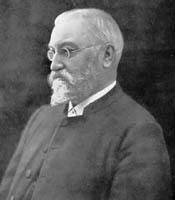Ethelbert William Bullinger
Ethelbert William Bullinger (born December 15, 1837 in Canterbury , England , † June 6, 1913 in London ) was an Anglican theologian and co-designer of consistent dispensationalism .
Life
Bullinger was the fifth child of William and Mary (Bent) Bullinger. Heinrich Bullinger , a leading theologian of Protestantism in the 16th century, was a direct ancestor.
Bullinger completed his training at King's College in London . His expertise in the field of biblical languages was so outstanding that the Archbishop of Canterbury awarded him an honorary doctorate in theology in 1881 .
Bullinger began his ministry in 1861 as an assistant pastor in Bermondsey . In 1862 he became a priest in the Church of England ordained . He then worked as a pastor in Tittleshall (1863–1866), Notting Hill (1866–1869), Leytonstone (1869–1870) and Walthamstow (1870–1874). In 1888 he resigned his pastorate at St. Stephen's, but retained his position as Secretary of the Trinitarian Bible Society and editor of the monthly Things to Come. A Journal of Biblical Literature which he had held since 1867.
theology
Dispensationalism
Bullinger has become known for consistently developing the dispensationalism of the time . Based on Hebrews 1: 1-2, in his work The Foundations of Dispensational Truth, he assigned the books of the Bible to dispensations according to the way God spoke to the recipients of his message:
- God speaks directly to individual people (from Adam to Moses),
- God speaks to Israel through prophets (from Moses to John),
- God speaks to Israel through his Son Jesus (from John to the Ascension: The four Gospels),
- God speaks to Israel through those "who have heard him" (including Peter, James: until Israel finally rejects national repentance in Acts 28.25, approx. 62 AD),
- God speaks to the nations through Paul (captivity letters and pastoral letters from Paul: Ephesians, Philippians, Colossians, Timothy, Titus and Philemon),
- God speaks to Israel through John (Revelation).
It is important to recognize that “Paul recorded the precious teachings that were hitherto hidden and could not be disclosed until Christ's suffering, death, resurrection, and ascension actually took place; because they have all this as a prerequisite. These doctrines can only be found in the letters from captivity (Ephesians, Philippians and Colossians) and here also belong the letters to Timothy, Titus and Philemon ”. Bullinger hopes for a cure "from an unconscious and biblical kleptomania, through which all promises of blessings were taken from Israel and given to the church".
He saw the following consequences:
- The mission command in the Gospels concerns only the Jews, not the church .
- The ministry of the twelve apostles was a continuation of Christ's earthly ministry .
- The church did not begin at Pentecost (as the dispensationalists had thought up to then), but with Acts 28:28.
- The baptism with water is not applicable to this church age, but only the Spirit baptism.
- There is a difference between Paul's earlier and later ministry (gradual revelations in Paul's letters). Only Paul's captivity and pastoral letters contain ultimate truths.
- Israel, not the church, is the bride of Christ .
This view was later called "Bullingerism" or "Ultradispensationalism" (because it went beyond the previously known dispensationalism).
additional
Bullinger believed in and taught premillenarianism and the pre- tribulation rapture ( pre-tribulationism ).
He also taught that the soul does not exist between death and resurrection (i.e. the traditional teaching of the immortal soul is unbiblical), mainly on the grounds that according to Genesis 2: 7 the soul consists of body and spirit and thus can no longer exist after death ( total death theory ).
Bullinger published the magazine Things to Come , which was primarily about biblical eschatology . Adolph Ernst Knoch published some articles there, which resulted in a lively exchange of ideas.
In 1909 Bullinger published the Companion Bible , which, based on the King James Bible translation, contains extensive word studies and aids for structuring the biblical letters and is still popular in the English-speaking world today.
Works (selection)
- Commentary on Revelation
- Word Studies on the Holy Spirit
- The Witness of the Stars
- The Book of Job
- Figures of Speech Used in the Bible
- Great Cloud of Witnesses
- The Critical Lexicon
- Concordance to the English and Greek New Testaments
- The Companion Bible, Kregel, 2000, ISBN 978-0-8254-2099-3
- The Two Natures in the Child of God (German: The two natures in the child of God , translated by Paul Müller, Rathmann, Marburg 1957; Stephanus, Uhldingen 1981)
- The Foundations of Dispensational Truth (German development of salvation history in the New Testament , Mössinger, Karlsbad, no year)
- How to Enjoy the Bible
literature
- Juanita S. Carey: EW Bullinger: A Biography . Kregel Publications 1988. ISBN 0-8254-2372-4 . ( online )
Web links
Individual evidence
- ↑ EW Bullinger: Development of Salvation History in the New Testament (translation of The Foundations of Dispensational Truth ) (PDF; 784 kB)
| personal data | |
|---|---|
| SURNAME | Bullinger, Ethelbert William |
| BRIEF DESCRIPTION | Contributor to consistent dispensationalism |
| DATE OF BIRTH | December 15, 1837 |
| PLACE OF BIRTH | Canterbury , England |
| DATE OF DEATH | June 6, 1913 |
| Place of death | London |
